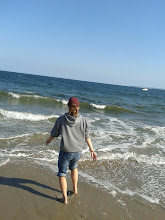So if you were a kid here growing up, what would you grow up to be someday? Just like anywhere else, Mauritania needs business people, trades people, sales people, farmers, teachers and doctors, but not always the same job description as you might think of in the USA. No matter what sector you are in, there will probably be a “guardian” who watches over the workplace, lets in people who are supposed to be there, and make tea.
Mining~
Here in Akjoujt we have a slightly different job market than elsewhere in country. The biggest difference is that here we have a mine. A large percentage of the community works there doing a variety of jobs. People from all over Mauritania come to work in the mines. There’s even a long waiting list just to get in! (Not only are Mauritanians drawn to work the mines, but workers from all over the world – from as close as Senegal to as far away as the Philippines!
Formal Business~
There are banks, companies and post offices, so there’s still a market for business people here. Most of these opportunities are in Nouakchott, but you can still find some in the regional capitals. Most businesses in the formal sector are owned by a few strong families in Mauritania. Many of the workers in this sector will have been educated at the University in Nouakchott. In the informal sector you’ll have cooperatives, boutiques, and other trades which will be discussed in a little bit.
Administrative Government positions~
All of education and healthcare is nationalized, and so there are many positions in any given city or town for administrative positions. This could be from the head of public schools or health care in the region to assistants, secretaries, and affectated personnel to certain hospitals or schools. In these positions it is rare (although it does occur) to find someone who does not speak Arabic and French. As we are in a predominately moor region, most will also speak Hassaniya, however that is not needed.
Cooperatives~
This is probably the staple of the informal business economy in Mauritania. It is a group of people who get together (usually single-sex due to cultural norms, but not always). Many times the cooperatives will focus on a particular trade such as agriculture, finance, or other trades. They are usually structured with a President, Vice President, and Treasurer; and may or may not be registered with the Government. If they are registered, that means that they are a formal cooperative (versus the informal) and eligible for government assistance.
Agriculture~
Obviously most of the agriculture activity will take place in the South along the Senegal River, but there is still quite a bit of activity here in the north as well. There are set seasons for certain items (such as Mango season, Manderine season, carrot season, etc.). Generally speaking, Mauritanians are not real big on the variety of vegetables and fruits in the diet, so a lot of what they grow they might not even eat. Probably the most popular item to grow is mint because they take that with their tea (and they take the tea at least 3 times a day!) Here in the north, even though the soil is quite rocky we are able to grow quite a few things, and carrots actually come from a town near Atar. Many primary schools have gardens complete with bell peppers, carrots, corn, and of course mint. I am in the process of planting a garden in my courtyard… I’ll have to let you know how it turns out (I am not very good with plants in general – so it’s definitely an uphill battle!).
Teachers~
Families here are usually quite large, and so there are many children to educate. Teachers have a 4 year degree from a university (usually Nouakchott) and will be affectated to teach in a city, town or village by the Government. They do have the option of requesting a change if they so desire, however that may or may not be granted. There are a variety of subjects taught at various levels including: math, science, French, Arabic, English, and geography.
Doctors~
People still get sick, so obviously there is a need for doctors, nurses, and other support staff. Many times as with other jobs that require higher education, these personnel are affectated by the central Government to a particular post. I’m not sure what kind of education is required to be a regular nurse, however to be a head nurse I believe (if I understood correctly) you need to have a 4 year degree from university in nursing related studies. A doctor obviously will have further training. In many bruisse sites there may not be a hospital, and even in regional capitals the amount of care that can be provided is limited. For all serious cases you will be transported to Nouakchott (fortunate for us that it’s so close – only 2.5 hours away).
Subscribe to:
Post Comments (Atom)

No comments:
Post a Comment